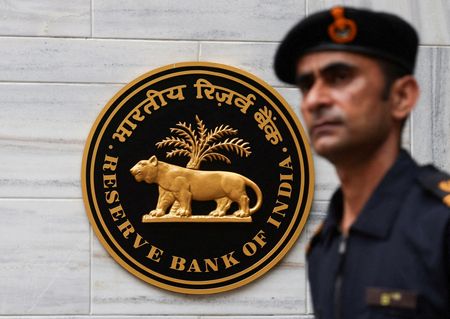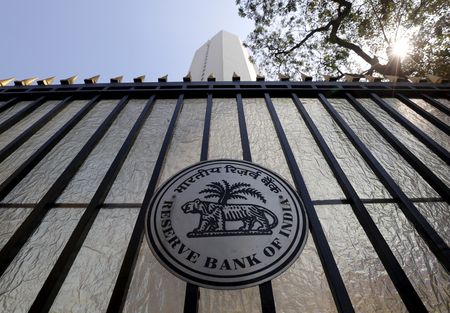BENGALURU (Reuters) -India’s central bank on Friday proposed limits to banks’ lending against stocks, bonds in capital markets, and for corporate acquisitions to ensure that lenders keep such businesses in check.
The Reserve Bank of India (RBI) issued a draft circular proposing that banks’ total direct exposure to capital markets and acquisition financing be capped at 20% of their tier-1 capital, weeks after it said it would ease restrictions on funding mergers and acquisitions.
Earlier this month, the regulator allowed banks to fund acquisitions and raised the cap on loans for buying shares at initial public offerings, as part of a raft of measures to boost bank lending in the world’s fifth-largest economy.
It had also permitted unfettered bank lending against listed debt securities, and raised the limit for lending against equity shares from 2 million rupees to 20 million rupees.
The RBI on Friday proposed that banks’ aggregate capital market exposure, including direct as well as indirect exposure through funds and guarantees, among others, should not exceed 40% of their tier 1 capital, and the exposure towards acquisition finance shall not exceed 10%.
Tier 1 capital, the highest-quality capital of a bank, includes equity, retained earnings, and certain instruments that can absorb losses.
The changes allow domestic banks to lend for acquisitions by Indian corporates, a segment so far cornered by foreign lenders and credit funds.
In its proposed rules for acquisition finance, the RBI said that banks may finance a maximum of 70% of the deal value, with at least 30% to be funded by the acquiring company.
It said that commercial banks can offer acquisition finance only to listed entities that have a satisfactory net worth and been profitable for the last three years, adding that the loan should be fully secured by the shares of the target company.
Separately, it proposed revised risk-weight guidelines for non-banking financial companies’ infrastructure loans, a move that could lower capital requirements for lenders financing established projects.
(Reporting by Nishit Navin; Editing by Shilpi Majumdar and Shinjini Ganguli)









